牛津译林版英语8BUnit 1 Past and Present Grammar课件(共37张PPT)
文档属性
| 名称 | 牛津译林版英语8BUnit 1 Past and Present Grammar课件(共37张PPT) | 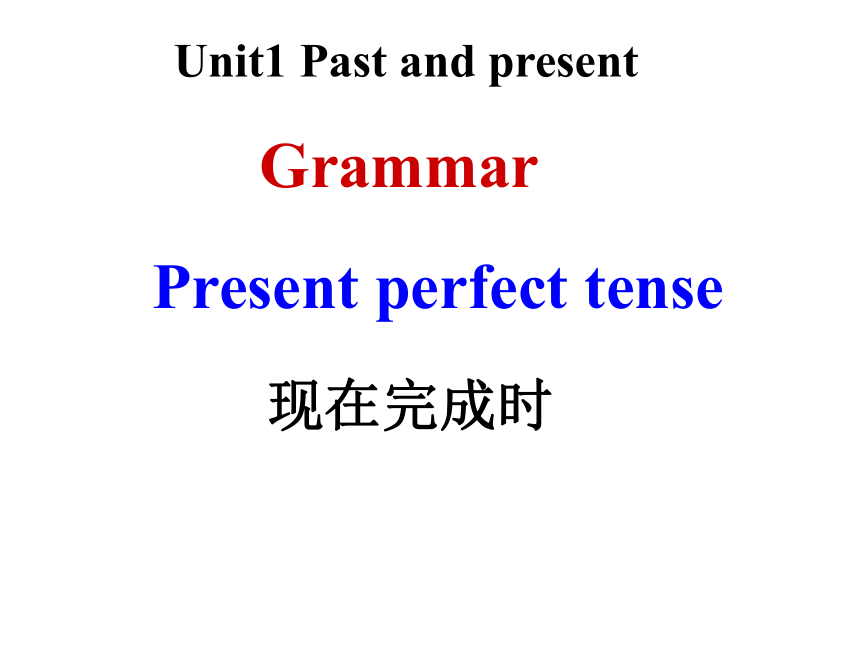 | |
| 格式 | zip | ||
| 文件大小 | 25.8KB | ||
| 资源类型 | 教案 | ||
| 版本资源 | 牛津译林版 | ||
| 科目 | 英语 | ||
| 更新时间 | 2017-02-15 20:31:33 | ||
图片预览

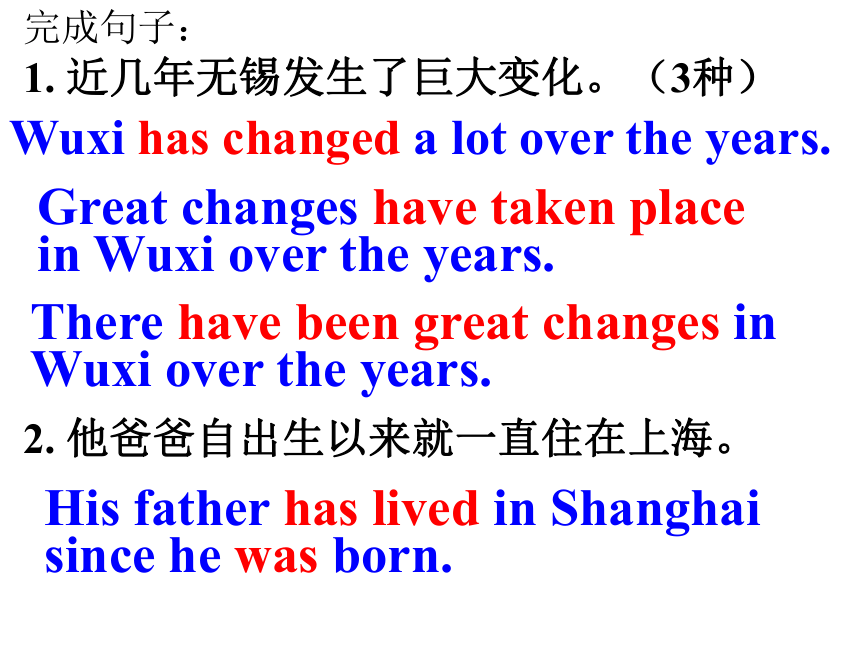
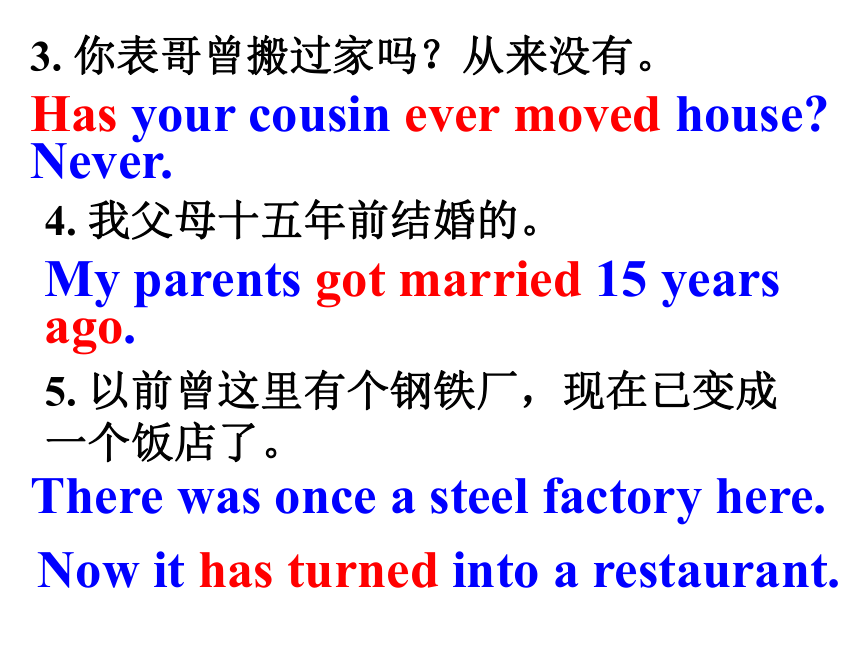
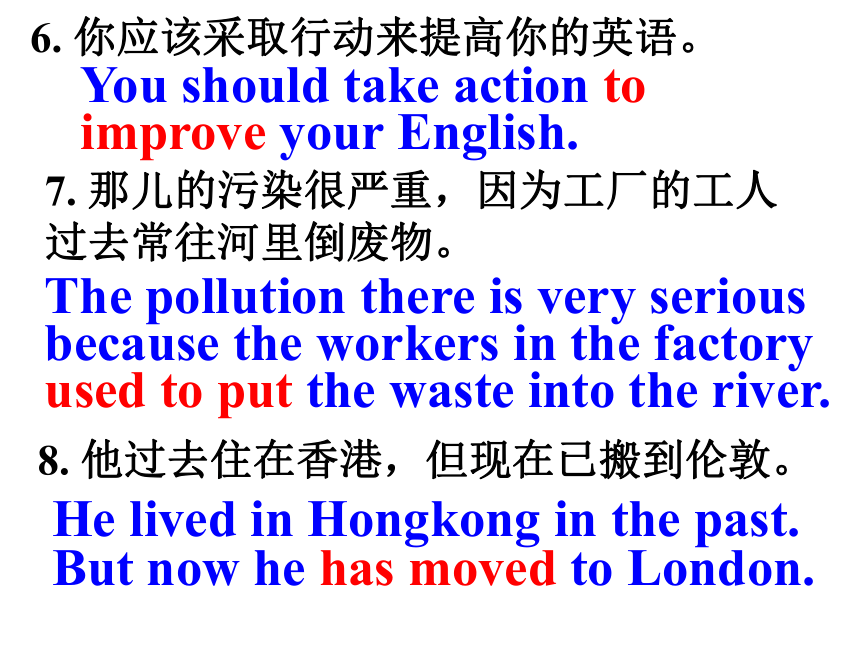
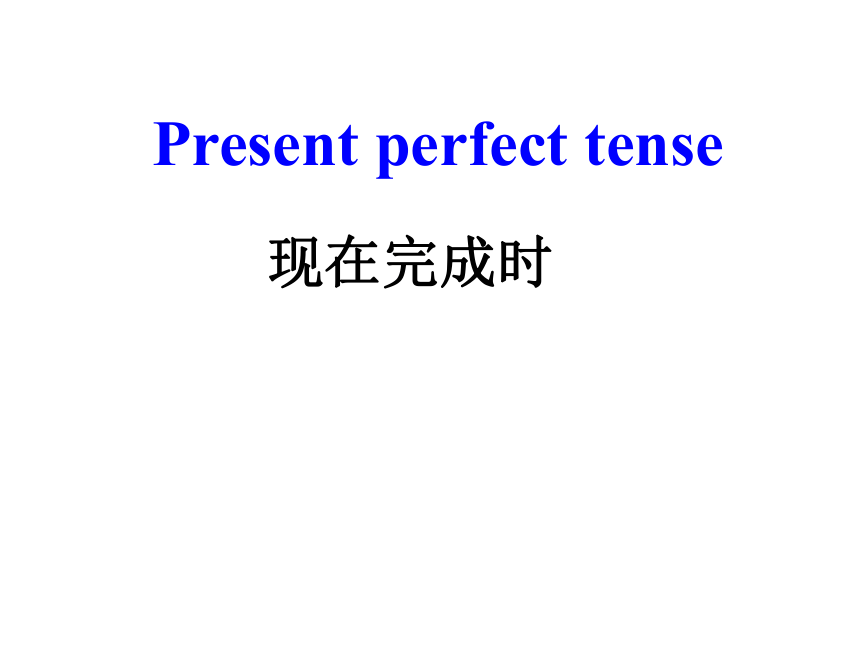
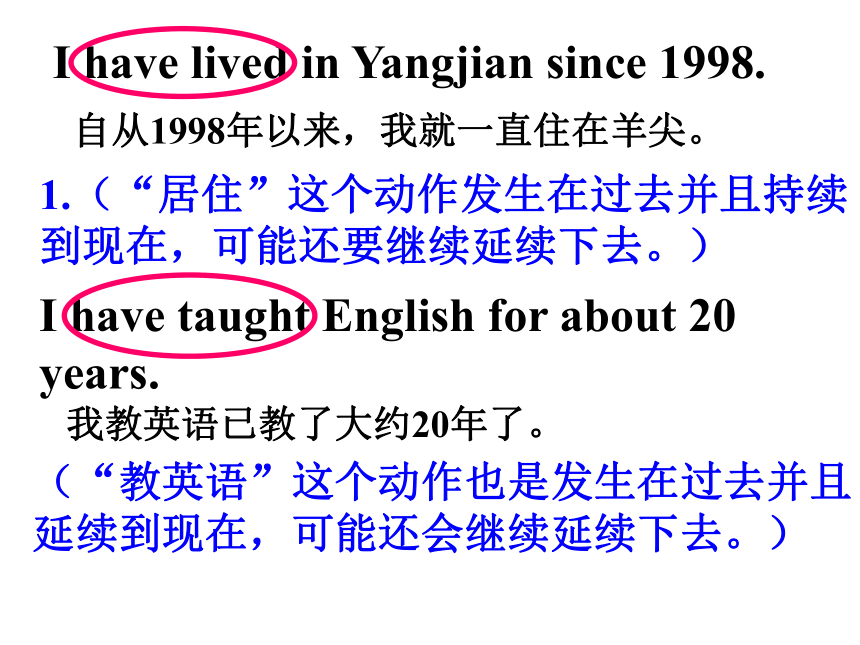
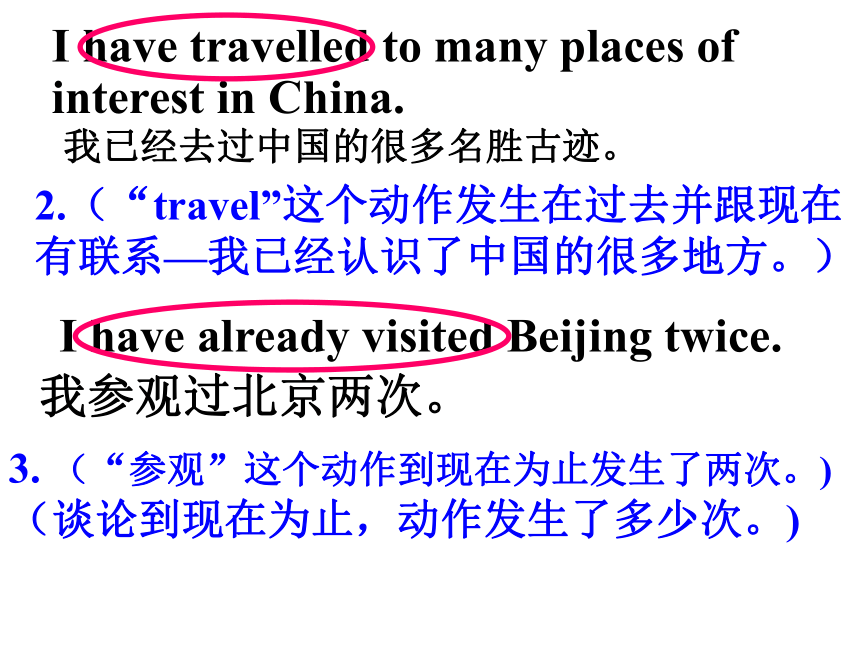
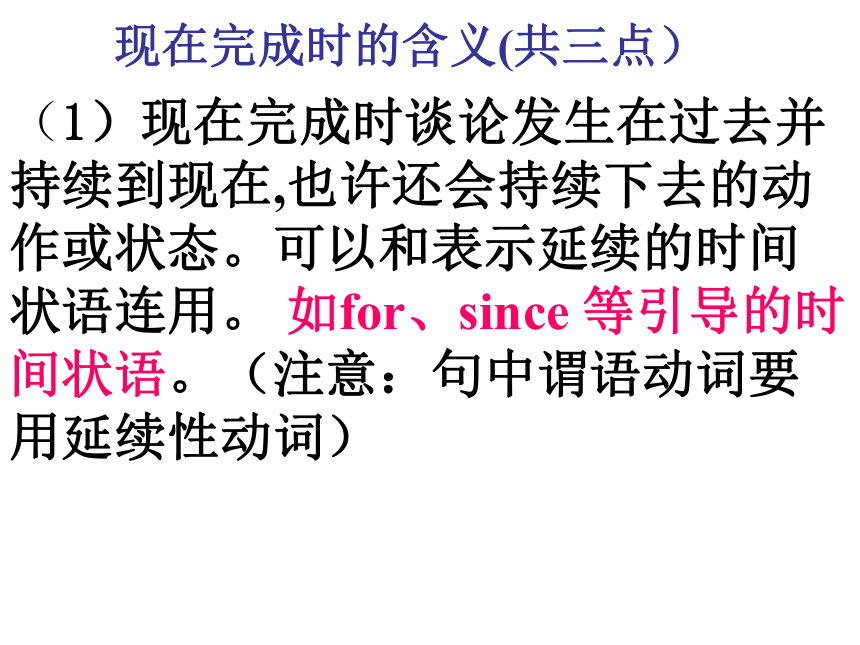
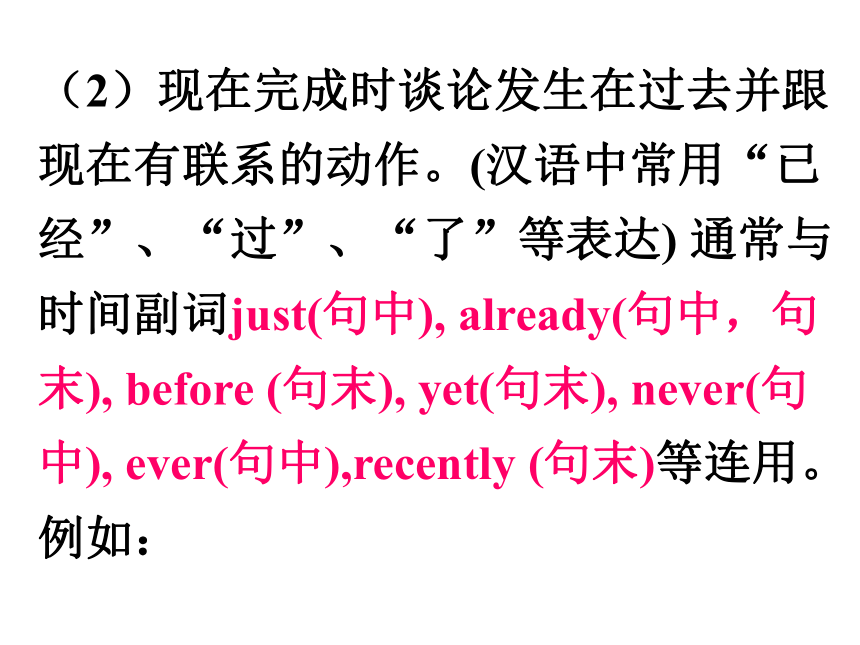

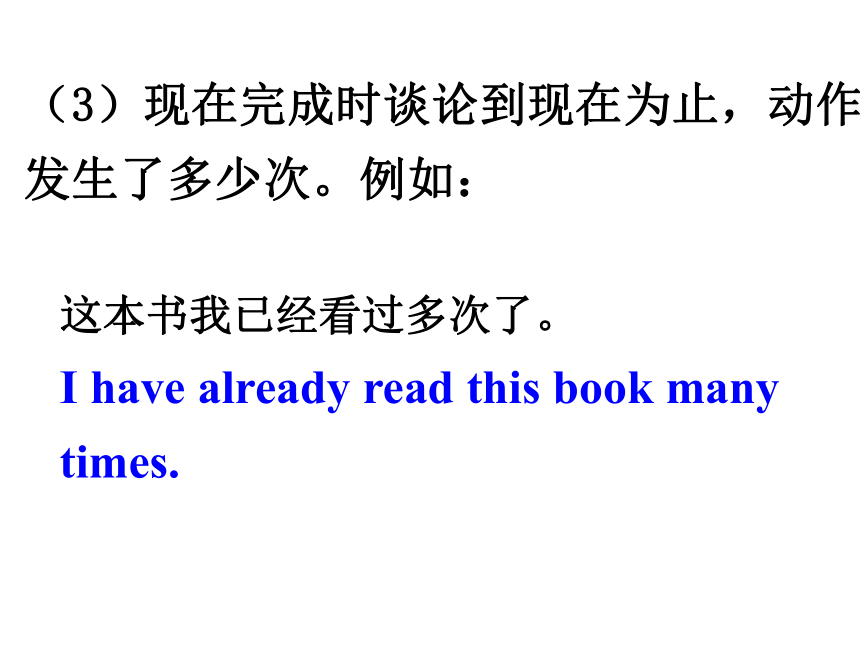
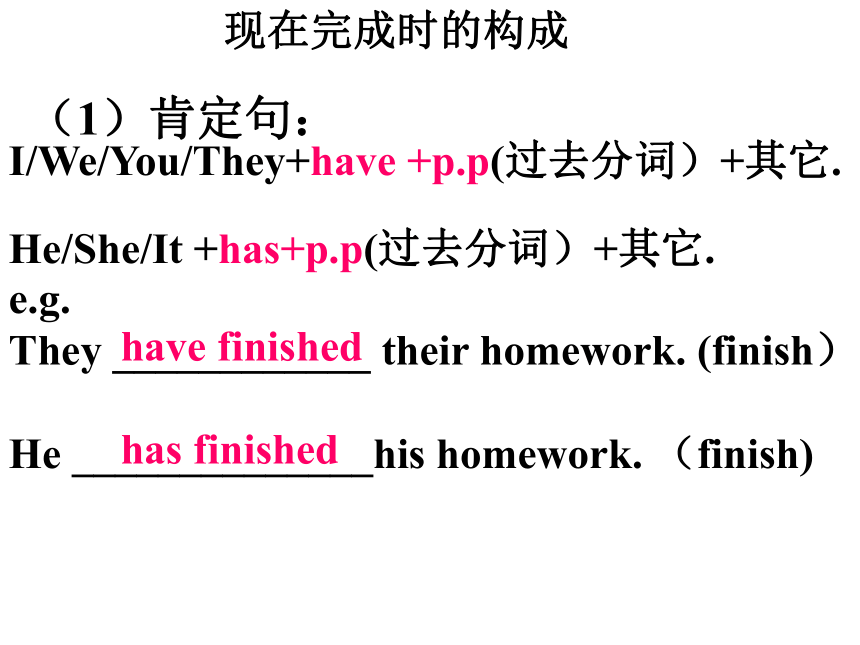
文档简介
课件37张PPT。Unit1 Past and presentGrammarPresent perfect tense现在完成时完成句子:1. 近几年无锡发生了巨大变化。(3种)2. 他爸爸自出生以来就一直住在上海。Wuxi has changed a lot over the years.Great changes have taken place in Wuxi over the years.There have been great changes in Wuxi over the years.His father has lived in Shanghai since he was born.3. 你表哥曾搬过家吗?从来没有。Has your cousin ever moved house? Never.4. 我父母十五年前结婚的。5. 以前曾这里有个钢铁厂,现在已变成一个饭店了。My parents got married 15 years ago.There was once a steel factory here. Now it has turned into a restaurant.6. 你应该采取行动来提高你的英语。7. 那儿的污染很严重,因为工厂的工人过去常往河里倒废物。8. 他过去住在香港,但现在已搬到伦敦。You should take action to improve your English.The pollution there is very serious because the workers in the factory used to put the waste into the river.He lived in Hongkong in the past.But now he has moved to London.Present perfect tense现在完成时I have lived in Yangjian since 1998.自从1998年以来,我就一直住在羊尖。I have taught English for about 20 years. 我教英语已教了大约20年了。1.(“居住”这个动作发生在过去并且持续
到现在,可能还要继续延续下去。)(“教英语”这个动作也是发生在过去并且
延续到现在,可能还会继续延续下去。)I have already visited Beijing twice.我参观过北京两次。3. (“参观”这个动作到现在为止发生了两次。)
(谈论到现在为止,动作发生了多少次。)I have travelled to many places of interest in China.我已经去过中国的很多名胜古迹。2.(“travel”这个动作发生在过去并跟现在
有联系—我已经认识了中国的很多地方。)现在完成时的含义(共三点)(1)现在完成时谈论发生在过去并持续到现在,也许还会持续下去的动作或状态。可以和表示延续的时间状语连用。 如for、since 等引导的时间状语。(注意:句中谓语动词要用延续性动词)(2)现在完成时谈论发生在过去并跟现在有联系的动作。(汉语中常用“已经”、“过”、“了”等表达) 通常与时间副词just(句中), already(句中,句末), before (句末), yet(句末), never(句中), ever(句中),recently (句末)等连用。例如:1.Eddie刚刚吃了我的食物。
Eddie has just eaten my food.
2.我以前从未听说过那件事。
I have never heard of that before.
3.你曾经骑过马吗?
Have you ever ridden a horse?
4.她早已经完成这个工作了。
She has already finished the work.
5.我们还没有完成作业。
We haven’t finished our homework yet.
6.近来我没有收到他的来信。
I haven’t heard from him recently.(3)现在完成时谈论到现在为止,动作发生了多少次。例如:这本书我已经看过多次了。
I have already read this book many times.现在完成时的构成(1)肯定句:I/We/You/They+have +p.p(过去分词)+其它.
He/She/It +has+p.p(过去分词)+其它.e.g.
They ____________ their homework. (finish)
He ______________his homework. (finish)have finished
has finished(2)否定句I/We/You/They+have not +p.p(过去分词)+其它.
He/She/It +has not +p.p(过去分词)+其它.e.g.
They _____________ their homework yet.
(finish)
He _____________ his homework yet. (finish) haven’t finished
hasn’t finished(3)一般疑问句及回答---Have+I/you/we/they+p.p(过去分词)+其它?
---Yes, I/you/we/they have.
---No, I/you/we/they haven’t.
---Has +she/he/it+p.p(过去分词) +其它?
---Yes, she/he/it has.
---No, she/he/it hasn’t.
e.g.
______you _________the film?(watch)
Yes, I ______.
____your father ________the film? (watch)
No, he _______. Have watched
haveHas watched
hasn’t (4)特殊疑问句特殊疑问词+have/has+主语+p.p(过去分词)
+其它?e.g.
The girl has learned English for 6 years.
I have eaten two apples for breakfast.How long has the girl learned English?What have you eaten for breakfast?
过去分词的构成(A) 规则动词:规则动词的过去分词的构成规则与规则动词的过去式的构成规则相同。四点变化规则(同过去式的构成): (1)、一般动词,在词尾直接加“ ed ”。
finish---finished---finished
(2)、以“ e ”结尾的动词,只在词尾加“ d ”。
change---changed---changed , (3)、以“辅音字母 + y ”结尾的动词,将 “y” 变为 “i” ,再加“ ed ”。
carry---carried---carried
(4)、重读闭音节结尾,末尾只有一个辅音字母,先双写该辅音字母,再加“ ed ”。
stop--stopped--stopped (B) 不规则动词的过去分词(Page122-123)Part A P14
1. borrowed
2. hoped
3. made
4. got
5. planned
6. cried
7. sent
8. watched
9. said
10. grown
11. hit
12. enjoyed
Part B: P14
1. have finished
2. has… visited
3. has repaired
4. haven’t seen
5. haven’t come
6. has taught
Part C: P14
1. have … seen
2. saw
3. have learned/ have learnt
4. have heard
Present perfect tense现在完成时1. 他已经做了作业。(改否定句)
2. 你曾经听说过这本书吗?没有。
3. 我曾经去过云南。
4. 我爸爸去过北京2次了。He has already done the homework.He hasn’t done the homework yet.Have you ever heard about the book? No, I haven’t.I have ever been to Yunnan.My father has been to Beijing twice.5. 以前我从来没有参观过博物馆。
6. 他刚刚回到家。
7. 自从那时起他就在一家工厂工作。
8. 他们结婚有5年了。
9. 最近这条河已变干净了。I have never visited the museum before.Hw has just come back home.He has worked in a factory since then.They have been married for 5 years.The river has become clean recently.现在完成时与一般过去时的区别I bought a new computer last week.
——只强调动作发生在过去。
I have bought a new computer.
——不强调动作什么时候发生,只强调现在的结果是拥有了一台新电脑。1)一般过去时表示过去某时发生的动作或单纯叙述过去的事情,强调动作,和现在不发生关系。
而现在完成时表示过去发生的某一动作对现在造成的影响或结果,强调的是现在的情况。
2)一般过去时常与具体的时间状语连用,而现在完成时通常与模糊的时间状语连用,或无时间状语。
◎ 一般过去时的时间状语有:yesterday, last week,…ago, in1980, in October, just now等具体的时间状语。
◎ 现在完成时的时间状语有:for, since, ever, never, just, already, yet, in the past years等不确定的时间状语。
ExercisesLet’s try! I’m sure you can do it well!1.I _________(see) the 3D film Avatar.
It’s amazing!
I ______(see) it one year ago. 2.--Is your grandfather still alive?
--No, he _______already ______(die).
--When _______he _______(die)?
--He _______last year(die). 3.I _______just _______ (hear) of the
earthquake in Qinhai. --The earthquake?
--Yes, it _________(happen) on
April 14th, 2010.have seensaw has dieddid diediedhave heardhappened4.Mr. Li _______(begin) to work
in this factory in 1990.
He ___________ (work) in the
factory for 21 years.5. The Greens ____________(live) in China since they _______(move) here in 2003.beganhas workedhave livedmovedLet’s try!用since或for填空:
1.I have been at this school _______ more than two years.
2. She has worked in the factory ______ ten years ago.
3. Mr. Green has lived in the city _____ he was born.
4. His father has been a party member ______ twenty years.
forforsincesinceLet’s try!1. She has already cleaned the kitchen. (改为否定句)
→She ______ cleaned the kitchen ___.
2. They have visited some interesting places in China. (改为一般疑问句)
→____ they _______ ____ interesting places in China?hasn’t yetHave visited any
3. The poor dog has died.(改为一般疑问句并作否定回答)
→______the poor dog _________?
No, it __________.
Has died
hasn’t4. They have borrowed ten books from the library. (对划线部分提问)
→______ ______books _______ they _________ from the library?
5. I have ever been to the Great Wall. (改为否定句)
I _____ ______ been to the Great Wall.
6. They have studied here since they moved to the city. (对划线部分提问)
_____ ______ _____ they ______ here?
How many have borrowedhave neverHow long have studied1.你最近看过电影吗?没有。
Have you seen any films recently? No, I haven’t.
2.这本书我已经读过许多遍了。
I have already read this book many times.
3.它是关于上世纪北京的变化的。
It’s about the changes in Beijing over the past century.
4.从这部电影中我了解了许多北京的过去和现在。
From this film, I have learnt more about Beijing’s past and present.5.我想我听说过这部电影。
I think I have heard about the film.
6.我上周六看来这部电影。
I saw the film last Saturday.
7.你打算再看一遍吗?是的,我想的。
Do you plan to see it again? Yes, I’d like to.
8.他们已经完成作业了。
They have finished their homework already.
9.约翰从未访问过中国。
John has never visited China.10.自星期一以来李先生已修理了十多辆自行车。
Mr Li has repaired over ten bicycles since Monday.
11.我们已经多年没有互相见面了。
We haven’t seen each other for years.
12.我父母还没有回来。
My parents haven’t come back yet.
13.我们老师教了我们许多有关中国的历史。
Our teacher has taught us a lot about the history of China.
到现在,可能还要继续延续下去。)(“教英语”这个动作也是发生在过去并且
延续到现在,可能还会继续延续下去。)I have already visited Beijing twice.我参观过北京两次。3. (“参观”这个动作到现在为止发生了两次。)
(谈论到现在为止,动作发生了多少次。)I have travelled to many places of interest in China.我已经去过中国的很多名胜古迹。2.(“travel”这个动作发生在过去并跟现在
有联系—我已经认识了中国的很多地方。)现在完成时的含义(共三点)(1)现在完成时谈论发生在过去并持续到现在,也许还会持续下去的动作或状态。可以和表示延续的时间状语连用。 如for、since 等引导的时间状语。(注意:句中谓语动词要用延续性动词)(2)现在完成时谈论发生在过去并跟现在有联系的动作。(汉语中常用“已经”、“过”、“了”等表达) 通常与时间副词just(句中), already(句中,句末), before (句末), yet(句末), never(句中), ever(句中),recently (句末)等连用。例如:1.Eddie刚刚吃了我的食物。
Eddie has just eaten my food.
2.我以前从未听说过那件事。
I have never heard of that before.
3.你曾经骑过马吗?
Have you ever ridden a horse?
4.她早已经完成这个工作了。
She has already finished the work.
5.我们还没有完成作业。
We haven’t finished our homework yet.
6.近来我没有收到他的来信。
I haven’t heard from him recently.(3)现在完成时谈论到现在为止,动作发生了多少次。例如:这本书我已经看过多次了。
I have already read this book many times.现在完成时的构成(1)肯定句:I/We/You/They+have +p.p(过去分词)+其它.
He/She/It +has+p.p(过去分词)+其它.e.g.
They ____________ their homework. (finish)
He ______________his homework. (finish)have finished
has finished(2)否定句I/We/You/They+have not +p.p(过去分词)+其它.
He/She/It +has not +p.p(过去分词)+其它.e.g.
They _____________ their homework yet.
(finish)
He _____________ his homework yet. (finish) haven’t finished
hasn’t finished(3)一般疑问句及回答---Have+I/you/we/they+p.p(过去分词)+其它?
---Yes, I/you/we/they have.
---No, I/you/we/they haven’t.
---Has +she/he/it+p.p(过去分词) +其它?
---Yes, she/he/it has.
---No, she/he/it hasn’t.
e.g.
______you _________the film?(watch)
Yes, I ______.
____your father ________the film? (watch)
No, he _______. Have watched
haveHas watched
hasn’t (4)特殊疑问句特殊疑问词+have/has+主语+p.p(过去分词)
+其它?e.g.
The girl has learned English for 6 years.
I have eaten two apples for breakfast.How long has the girl learned English?What have you eaten for breakfast?
过去分词的构成(A) 规则动词:规则动词的过去分词的构成规则与规则动词的过去式的构成规则相同。四点变化规则(同过去式的构成): (1)、一般动词,在词尾直接加“ ed ”。
finish---finished---finished
(2)、以“ e ”结尾的动词,只在词尾加“ d ”。
change---changed---changed , (3)、以“辅音字母 + y ”结尾的动词,将 “y” 变为 “i” ,再加“ ed ”。
carry---carried---carried
(4)、重读闭音节结尾,末尾只有一个辅音字母,先双写该辅音字母,再加“ ed ”。
stop--stopped--stopped (B) 不规则动词的过去分词(Page122-123)Part A P14
1. borrowed
2. hoped
3. made
4. got
5. planned
6. cried
7. sent
8. watched
9. said
10. grown
11. hit
12. enjoyed
Part B: P14
1. have finished
2. has… visited
3. has repaired
4. haven’t seen
5. haven’t come
6. has taught
Part C: P14
1. have … seen
2. saw
3. have learned/ have learnt
4. have heard
Present perfect tense现在完成时1. 他已经做了作业。(改否定句)
2. 你曾经听说过这本书吗?没有。
3. 我曾经去过云南。
4. 我爸爸去过北京2次了。He has already done the homework.He hasn’t done the homework yet.Have you ever heard about the book? No, I haven’t.I have ever been to Yunnan.My father has been to Beijing twice.5. 以前我从来没有参观过博物馆。
6. 他刚刚回到家。
7. 自从那时起他就在一家工厂工作。
8. 他们结婚有5年了。
9. 最近这条河已变干净了。I have never visited the museum before.Hw has just come back home.He has worked in a factory since then.They have been married for 5 years.The river has become clean recently.现在完成时与一般过去时的区别I bought a new computer last week.
——只强调动作发生在过去。
I have bought a new computer.
——不强调动作什么时候发生,只强调现在的结果是拥有了一台新电脑。1)一般过去时表示过去某时发生的动作或单纯叙述过去的事情,强调动作,和现在不发生关系。
而现在完成时表示过去发生的某一动作对现在造成的影响或结果,强调的是现在的情况。
2)一般过去时常与具体的时间状语连用,而现在完成时通常与模糊的时间状语连用,或无时间状语。
◎ 一般过去时的时间状语有:yesterday, last week,…ago, in1980, in October, just now等具体的时间状语。
◎ 现在完成时的时间状语有:for, since, ever, never, just, already, yet, in the past years等不确定的时间状语。
ExercisesLet’s try! I’m sure you can do it well!1.I _________(see) the 3D film Avatar.
It’s amazing!
I ______(see) it one year ago. 2.--Is your grandfather still alive?
--No, he _______already ______(die).
--When _______he _______(die)?
--He _______last year(die). 3.I _______just _______ (hear) of the
earthquake in Qinhai. --The earthquake?
--Yes, it _________(happen) on
April 14th, 2010.have seensaw has dieddid diediedhave heardhappened4.Mr. Li _______(begin) to work
in this factory in 1990.
He ___________ (work) in the
factory for 21 years.5. The Greens ____________(live) in China since they _______(move) here in 2003.beganhas workedhave livedmovedLet’s try!用since或for填空:
1.I have been at this school _______ more than two years.
2. She has worked in the factory ______ ten years ago.
3. Mr. Green has lived in the city _____ he was born.
4. His father has been a party member ______ twenty years.
forforsincesinceLet’s try!1. She has already cleaned the kitchen. (改为否定句)
→She ______ cleaned the kitchen ___.
2. They have visited some interesting places in China. (改为一般疑问句)
→____ they _______ ____ interesting places in China?hasn’t yetHave visited any
3. The poor dog has died.(改为一般疑问句并作否定回答)
→______the poor dog _________?
No, it __________.
Has died
hasn’t4. They have borrowed ten books from the library. (对划线部分提问)
→______ ______books _______ they _________ from the library?
5. I have ever been to the Great Wall. (改为否定句)
I _____ ______ been to the Great Wall.
6. They have studied here since they moved to the city. (对划线部分提问)
_____ ______ _____ they ______ here?
How many have borrowedhave neverHow long have studied1.你最近看过电影吗?没有。
Have you seen any films recently? No, I haven’t.
2.这本书我已经读过许多遍了。
I have already read this book many times.
3.它是关于上世纪北京的变化的。
It’s about the changes in Beijing over the past century.
4.从这部电影中我了解了许多北京的过去和现在。
From this film, I have learnt more about Beijing’s past and present.5.我想我听说过这部电影。
I think I have heard about the film.
6.我上周六看来这部电影。
I saw the film last Saturday.
7.你打算再看一遍吗?是的,我想的。
Do you plan to see it again? Yes, I’d like to.
8.他们已经完成作业了。
They have finished their homework already.
9.约翰从未访问过中国。
John has never visited China.10.自星期一以来李先生已修理了十多辆自行车。
Mr Li has repaired over ten bicycles since Monday.
11.我们已经多年没有互相见面了。
We haven’t seen each other for years.
12.我父母还没有回来。
My parents haven’t come back yet.
13.我们老师教了我们许多有关中国的历史。
Our teacher has taught us a lot about the history of China.
